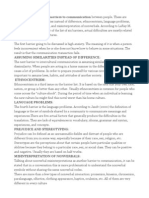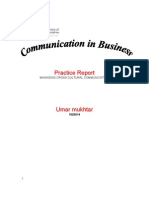Individual
Individual
Uploaded by
J J Love OriyomiCopyright:
Available Formats
Individual
Individual
Uploaded by
J J Love OriyomiCopyright
Available Formats
Share this document
Did you find this document useful?
Is this content inappropriate?
Copyright:
Available Formats
Individual
Individual
Uploaded by
J J Love OriyomiCopyright:
Available Formats
Individual Leader of a Global Organization Presentation
You are a leader in a global organization and have been asked to make a presentation to the Board of Directors about the importance of a diversity-conscious organization. Resources: readings Create a 6- to 8-slide Microsoft PowerPoint presentation. For Online and Directed Study students, these are Microsoft PowerPoint presentations with notes.
Identify the following: The characteristics of diversity-conscious leaders The differences between individualistic and collectivistic societies when communicating globally, including virtual communication How technological changes influence diversity in leadership How to improve diversity consciousness within the workplace
Include a concluding slide with a list of reference materials used from the text or outside sources.
The world would be so tedious; the diversity will be less, in the sense that there will be few movements of people around the globe. The world will be more peaceful because there will be less war causality, because norms and values will be more respected; the ethnicity value in each region will be of utmost important.
which will limit there will leess movement .
Could you imagine the world just speaking one language? I have no clue what it would be, but do you like the idea or not? I think it would be helpful in some ways. It would save us all the time that we spend on studying languages and end some controversy. But I can also see some downsides. This would be a nearly impossible feat to achieve and would also get rid of the values the language had on the people. But, I still believe it is a good idea. There are many other things that make people diverse. Although it would be hard to do, I think we should have only one language.
Key Characteristics of a Leader:
The characteristics of diversity-conscious leaders
Honesty - Display sincerity, integrity, and candor in all your actions. Deceptive behavior will not inspire trust. Competent - Your actions should be based on reason and moral principles. Do not make decisions based on childlike emotional desires or feelings. Forward-looking Set goals and have a vision of the future. The vision must be owned throughout the organization. Effective leaders envision what they want and how to get it. They habitually pick priorities stemming from their basic values. Inspiring - Display confidence in all that you do. By showing endurance in mental, physical, and spiritual stamina, you will inspire others to reach for new heights. Take charge when necessary. Intelligent - Read, study, and seek challenging assignments. Fair-minded - Show fair treatment to all people. Prejudice is the enemy of justice. Display empathy by being sensitive to the feelings, values, interests, and well-being of others. Broad-minded - Seek out diversity. Courageous - Have the perseverance to accomplish a goal, regardless of the seemingly insurmountable obstacles. Display a confident calmness when under stress. Straightforward - Use sound judgment to make good decisions at the right time. Imaginative - Make timely and appropriate changes in your thinking, plans, and methods. Show creativity by thinking of new and better goals, ideas, and solutions to problems. Be innovative!
NOTE: Diversity consciousness provides leaders with the skills to promote interpersonal openness and build relationships in a global, multicultural environment. Of these skills, three of the most important are adapting, thinking and communicating inclusively, and self-monitoring.
The differences between individualistic and collectivistic societies when communicating globally, including virtual communication
Individuals from different cultures vary in terms of their communication and group behaviors including the motivation to seek and disclose individuating information and in the need to engage in self categorization (Gudykunst, 1997). One major dimension of cultural variability is individualism-collectivism (Hofstede, 1980). In individualistic cultures, the needs, values, and goals of the individual take precedence over the needs, values, and goals of the in group. In collectivist cultures, the needs, values, and goals of the in group take precedence over the needs, values, and goals of the individual (Gudykunst, 1997; Hofstede, 1980). The research suggests that individuals from individualistic cultures tend to be less concerned with self-categorizing, are less influenced by group membership, have greater skills in entering and leaving new groups, and engage in more open and precise communication than individuals from collectivist cultures (Hall, 1976; Hofstede, 1980, 1991). In addition, the willingness to respond to ambiguous messages, interpreted by Pearce (1974) to be a trusting behavior, has been shown to be higher among members of individualistic cultures than among members of collectivist cultures (Gudykunst et al., 1996). These findings suggest that individuals from individualistic cultures might be more ready to trust others than individuals from collectivist cultures in computermediated communication environments.
How technological changes influence diversity in leadership
You might also like
- Private - Lost Secrets of The Sacred Ark (16288949)Document10 pagesPrivate - Lost Secrets of The Sacred Ark (16288949)Gordon Scott Taylor100% (1)
- The Book of Stratagems Tactics For Triumph and SurvivalDocument424 pagesThe Book of Stratagems Tactics For Triumph and SurvivalOctavio Hernández Baruch67% (3)
- Chapter 5 Getting To Know Your Diverse WorkplaceDocument41 pagesChapter 5 Getting To Know Your Diverse WorkplaceTaimur ShahidNo ratings yet
- The Leader's Guide To Corporate CultureDocument15 pagesThe Leader's Guide To Corporate CultureSyed Abu HurairaNo ratings yet
- Business Communication AssignmentDocument19 pagesBusiness Communication AssignmentOmar FarukNo ratings yet
- G Baby StepsDocument13 pagesG Baby Stepsonessa7No ratings yet
- Bernard Williams Equality NotesDocument5 pagesBernard Williams Equality NotesSeung Yoon Lee100% (1)
- Chap 4Document22 pagesChap 4Lê Phan Thảo VyNo ratings yet
- Cultral DiversityDocument8 pagesCultral Diversityanujsaxena965No ratings yet
- Bcom SDocument4 pagesBcom StbendeNo ratings yet
- Leader: Reyes, Jenny Members:: Nasser, Norhanah Orquia, Simon Omotoy, Jervis Palpalatoc, Nica Raagas, MaybelynDocument26 pagesLeader: Reyes, Jenny Members:: Nasser, Norhanah Orquia, Simon Omotoy, Jervis Palpalatoc, Nica Raagas, MaybelynDanielle May ReginaldoNo ratings yet
- Purposive Communication ReportingDocument14 pagesPurposive Communication ReportingJommel TejereroNo ratings yet
- Cross Cultural Leadership Literature ReviewDocument6 pagesCross Cultural Leadership Literature Reviewafdttricd100% (1)
- Communicating Across CulturesDocument42 pagesCommunicating Across CulturesAaryav AnandNo ratings yet
- Practice Report: Managing Cross Cultural CommunicationDocument10 pagesPractice Report: Managing Cross Cultural CommunicationUmar MukhtarNo ratings yet
- Global Leaders and CultureDocument14 pagesGlobal Leaders and CultureNanoo OmarNo ratings yet
- Personal Development Plan TemplateDocument7 pagesPersonal Development Plan Templateapi-587575834No ratings yet
- Review LessonDocument61 pagesReview LessonScott HoNo ratings yet
- Purposive-Communication-Reporting Group 1Document17 pagesPurposive-Communication-Reporting Group 1Jommel TejereroNo ratings yet
- Global MindsetDocument1 pageGlobal Mindsetkong_yau_2No ratings yet
- MODULE 3 Six Signature Traits: Now What?Document4 pagesMODULE 3 Six Signature Traits: Now What?RohitNo ratings yet
- Cross CulturalDocument17 pagesCross CulturalAparna HemanthNo ratings yet
- Almut Koester, Angela Pitt, Michael Handford, Martin Lisboa - Chương 1Document8 pagesAlmut Koester, Angela Pitt, Michael Handford, Martin Lisboa - Chương 1Kim HồngNo ratings yet
- Who We Are: Exploring What Makes Us Who We Are Helps Us To Relate To OthersDocument3 pagesWho We Are: Exploring What Makes Us Who We Are Helps Us To Relate To Othersapi-293625288No ratings yet
- Chapter 2 Purposive CommDocument19 pagesChapter 2 Purposive CommcosmicNo ratings yet
- Chpter 1Document5 pagesChpter 1topaneh316No ratings yet
- Document 3Document3 pagesDocument 3shahrusha7473No ratings yet
- Global Leaders and CultureDocument15 pagesGlobal Leaders and CultureEngie Essam ZahranNo ratings yet
- The Ear of The Leader Must Ring With The Voices of The PeopleDocument10 pagesThe Ear of The Leader Must Ring With The Voices of The PeopleHina Safarish GillNo ratings yet
- Diversity Awareness - How Diversity Can Strengthen Each Students Sense of Belonging in Our ClassroomsDocument16 pagesDiversity Awareness - How Diversity Can Strengthen Each Students Sense of Belonging in Our Classroomsapi-302927732No ratings yet
- The Diverse WorkforceDocument22 pagesThe Diverse WorkforceHausland Const. Corp.No ratings yet
- Professional Communication - Chapter 8 AssignmentDocument4 pagesProfessional Communication - Chapter 8 AssignmentJahra MusgraveNo ratings yet
- Multicultural Collaboration: Two or More Organizations Working TogetherDocument5 pagesMulticultural Collaboration: Two or More Organizations Working TogetherAahmadNo ratings yet
- Week 1 To 3Document9 pagesWeek 1 To 3March Dequi�ANo ratings yet
- Emotional and Cultural Intelligence Lecture-1Document24 pagesEmotional and Cultural Intelligence Lecture-1TOMIWA AKINPELUNo ratings yet
- Cross Culture ModuleDocument7 pagesCross Culture ModuleChetan NarkhedeNo ratings yet
- Local and Global Communication in Multicultural SettingsDocument18 pagesLocal and Global Communication in Multicultural SettingsIvan SanielNo ratings yet
- SA Diversity AwarenessDocument8 pagesSA Diversity AwarenessSandy K. AtchisonNo ratings yet
- Managing International Business (MIB) : Culture Environments Facing Business Cross-National Cooperation and AgreementsDocument36 pagesManaging International Business (MIB) : Culture Environments Facing Business Cross-National Cooperation and AgreementsEvangelystha Lumban TobingNo ratings yet
- English of Business s3 c2.3.4.5.6Document18 pagesEnglish of Business s3 c2.3.4.5.6baazizlamis7No ratings yet
- Culture and Business Notes IBDocument3 pagesCulture and Business Notes IBLess BalesoroNo ratings yet
- Lesson 5-6 in 20-21 2nd Term in Purposive CommunicationDocument7 pagesLesson 5-6 in 20-21 2nd Term in Purposive CommunicationLes LieNo ratings yet
- Categories of Audience AnalysisDocument2 pagesCategories of Audience Analysisreign acostaNo ratings yet
- Asyncronous Activity Monday and Tuesday ClassesDocument2 pagesAsyncronous Activity Monday and Tuesday Classespau mejaresNo ratings yet
- Chapter 5. Adapting To Your Audience and Situation: I. Why Audience Analysis Is ImportantDocument15 pagesChapter 5. Adapting To Your Audience and Situation: I. Why Audience Analysis Is ImportantKateNo ratings yet
- Final Version 2.0 English ClassDocument46 pagesFinal Version 2.0 English Classfaquir2xNo ratings yet
- ICC Study Guide-1Document5 pagesICC Study Guide-1moreblessingmarvellous659No ratings yet
- Module 6Document10 pagesModule 6omahachemNo ratings yet
- Functions of CommunicationDocument4 pagesFunctions of CommunicationJanet PaggaoNo ratings yet
- Opportunities and Challenges of Communication in A Diverse WorldDocument14 pagesOpportunities and Challenges of Communication in A Diverse Worldsuraj lamaNo ratings yet
- Module 2: Communication and GlobalizationDocument17 pagesModule 2: Communication and GlobalizationJaneNo ratings yet
- NODALO - Introduction To Multicultural DiversityDocument4 pagesNODALO - Introduction To Multicultural Diversityedrick lacbayoNo ratings yet
- CCC MnotesDocument6 pagesCCC MnotesTino AlappatNo ratings yet
- Cross Cultural LeadershipDocument6 pagesCross Cultural LeadershipSabriye ÇayırcıNo ratings yet
- Chapter 2 - Globalization, Diversity and EthicsDocument12 pagesChapter 2 - Globalization, Diversity and EthicsTrixxie mae MontelloNo ratings yet
- Eight-Scale Tool For Mapping Cultural Differences by Erin MeyerDocument4 pagesEight-Scale Tool For Mapping Cultural Differences by Erin MeyerShreya Sharma100% (1)
- Cross Cultural ManagementDocument49 pagesCross Cultural Managementbharatikumar100% (1)
- Managing Across CulturesDocument8 pagesManaging Across Cultures[••]No ratings yet
- Chapter 2 - Globalization, Diversity and EthicsDocument10 pagesChapter 2 - Globalization, Diversity and EthicsPhee JhayNo ratings yet
- Notes Low High ContextDocument4 pagesNotes Low High ContextLenny ChuaNo ratings yet
- Be Advantage 10-12Document3 pagesBe Advantage 10-12Brayan EscobarNo ratings yet
- Bourgeois 1980Document16 pagesBourgeois 1980mariam yanalsNo ratings yet
- Conversion To IslamDocument2 pagesConversion To Islamhassan hashirNo ratings yet
- HBSE 2 SW and Filipino PersonalityDocument6 pagesHBSE 2 SW and Filipino PersonalityRhyy PascualNo ratings yet
- Q ParameterizationDocument17 pagesQ ParameterizationTRANNo ratings yet
- UTS Reviewer The Material Self MidtermDocument1 pageUTS Reviewer The Material Self MidtermYay or Nay Panel DiscussionNo ratings yet
- Mcvey Mary - Benchmark - Leadership Style and PhilosophyDocument6 pagesMcvey Mary - Benchmark - Leadership Style and Philosophyapi-529486237No ratings yet
- Amp3033 Pengenalan Kepada Penyelidikan Dalam Pendidikan MuzikDocument14 pagesAmp3033 Pengenalan Kepada Penyelidikan Dalam Pendidikan Muzikalif ridhzuanNo ratings yet
- Final Exam - SemanticsDocument3 pagesFinal Exam - SemanticsJOAN L. TORREONNo ratings yet
- 11 Physics Solved 01 New Sol Dwe PDFDocument19 pages11 Physics Solved 01 New Sol Dwe PDFPulak MandalNo ratings yet
- Educated Parents Article 1Document6 pagesEducated Parents Article 1api-272536998No ratings yet
- U.S. Coast Guard Academy Comprehensive Climate and Culture Optimization Review EffortDocument276 pagesU.S. Coast Guard Academy Comprehensive Climate and Culture Optimization Review Effortcgreport100% (1)
- A Common LanguageDocument63 pagesA Common LanguagePalel CatalinNo ratings yet
- HL Lsa4 BeDocument17 pagesHL Lsa4 BeEmily JamesNo ratings yet
- Diversity Management: Paradigms, Rationale, and Key ElementsDocument18 pagesDiversity Management: Paradigms, Rationale, and Key ElementsJoon Alpine100% (1)
- Autonomous Maintenance Review - Chapterss 1-6Document84 pagesAutonomous Maintenance Review - Chapterss 1-6Steve Carwell100% (1)
- The Inscrutable Shopper: Consumer Resistance in RetailDocument17 pagesThe Inscrutable Shopper: Consumer Resistance in RetailBusiness Expert PressNo ratings yet
- Communication Skills - Formal and Informal CommunicationDocument2 pagesCommunication Skills - Formal and Informal Communicationtulasinad123100% (1)
- Introduction To Business Research: ©the Mcgraw-Hill Companies, Inc., 2001 Irwin/Mcgraw-HillDocument12 pagesIntroduction To Business Research: ©the Mcgraw-Hill Companies, Inc., 2001 Irwin/Mcgraw-HillyunikepuspitaNo ratings yet
- Vda de Kilayko v. Tengco - FULL TEXTDocument12 pagesVda de Kilayko v. Tengco - FULL TEXTJeng PionNo ratings yet
- Build Your Own 2D Game Engine and Create Great Web GamesDocument1 pageBuild Your Own 2D Game Engine and Create Great Web GamesangelviNo ratings yet
- Nursing Intervention To Enhance Acceptance of Pregnancy in First-Time Mothers: Focusing On The Comfortable Experiences of Pregnant WomenDocument8 pagesNursing Intervention To Enhance Acceptance of Pregnancy in First-Time Mothers: Focusing On The Comfortable Experiences of Pregnant WomenI'm Gorgeous G.GNo ratings yet
- Eisenhower's 1954 Meeting With Extraterrestrials - The Fiftieth Anniversary of The First Contact?Document14 pagesEisenhower's 1954 Meeting With Extraterrestrials - The Fiftieth Anniversary of The First Contact?mysticdream100% (2)
- Balancing High School and Part-Time WorkDocument3 pagesBalancing High School and Part-Time WorkYusmaniar TukijanNo ratings yet
- Begone Satan!: Rev. Celestine KapsnerDocument32 pagesBegone Satan!: Rev. Celestine KapsnerEdward OropezaNo ratings yet
- IELTS Writing Sample With ExaminerDocument6 pagesIELTS Writing Sample With ExaminermiftaNo ratings yet
























































































